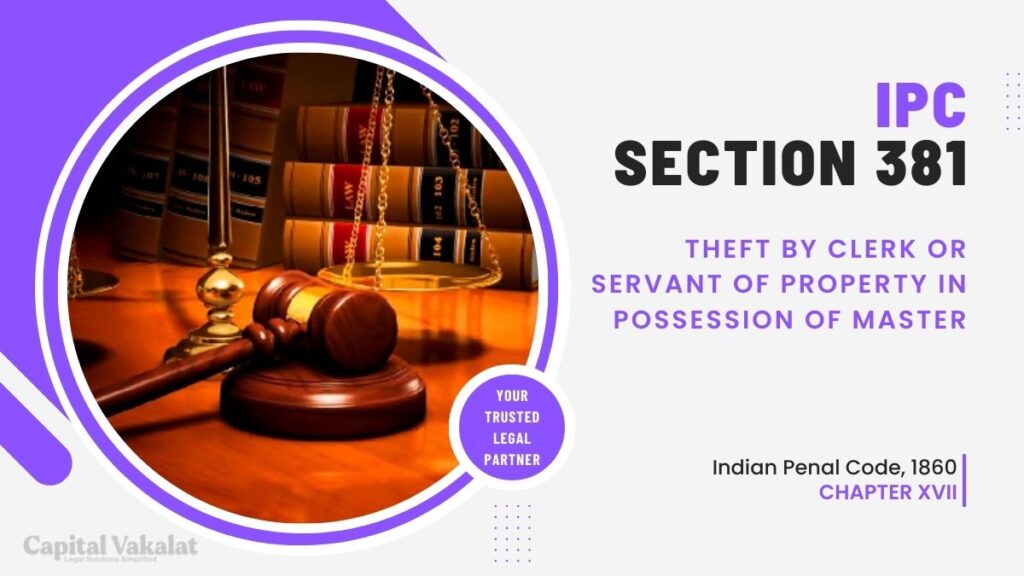Theft is an age-old crime that takes various forms, but when committed by a clerk or servant against their own master, it raises unique legal challenges. Section 381 of the Indian Penal Code (IPC) addresses this specific scenario, shedding light on the legal repercussions for individuals engaged in such activities.

In this article, we will delve into the intricacies of Section 381 IPC, exploring its elements, legal consequences, prevention measures, and the impact it has on employers.
Understanding Section 381 IPC
Section 381 IPC outlines the legal framework for addressing theft by clerks or servants. It establishes the parameters within which such offenses are defined and prosecuted. It is essential to distinguish this offense from other related crimes to understand its implications fully.
Elements of the Offense: Conditions for Prosecution
To convict an individual under Section 381 IPC, specific conditions must be met. These conditions include a detailed examination of the actions of the clerk or servant and the nature of the property in possession of the master. Clarifying the definition of ‘property in possession’ is crucial for a comprehensive understanding.
Legal Consequences: Penalties and Punishments
Individuals found guilty under Section 381 IPC face significant legal consequences. Penalties may vary based on the severity of the offense and the value of the stolen property. Real-life case studies can provide insights into the legal outcomes and help in understanding the gravity of such actions.
Prevention Measures: Safeguarding Employer Interests
Employers can take proactive measures to safeguard their property from theft by clerks or servants. Implementing stringent security measures, conducting thorough background checks, and employing surveillance technology are essential steps in preventing such incidents.
Challenges in Prosecution: Overcoming Legal Obstacles
Proving theft by clerks or servants can be challenging, and various legal hurdles may arise during prosecution. Examining common obstacles and understanding legal precedents that have shaped the interpretation of Section 381 IPC is crucial for a fair and effective legal process.
Impact on Employers: Economic Consequences
The economic consequences of theft by clerks or servants extend beyond the immediate loss of property. Businesses may suffer reputational damage, loss of customer trust, and financial setbacks. Maintaining a secure work environment is essential for fostering trust and preventing such incidents.
Reforms and Amendments: Evolution of Legal Provisions
Section 381 IPC has undergone historical changes, reflecting shifts in societal norms and legal perspectives. Exploring past reforms and amendments provides insights into the evolution of legal frameworks and ongoing debates surrounding this section.
Real-world Examples: Lessons from Notable Cases
Examining real-world examples of theft by clerks or servants highlights the diverse nature of such incidents. Drawing lessons from these cases can aid in developing proactive strategies to prevent similar occurrences.
Conclusion
In conclusion, Section 381 IPC plays a crucial role in addressing theft by clerks or servants. Businesses and employers must be vigilant, implementing preventive measures to secure their property and uphold trust within the workplace. Legal awareness and a proactive approach are essential for navigating the complexities of this legal provision.
Frequently Asked Questions
How can employers protect their property from theft by employees?
Employers can implement security measures, conduct background checks, and use surveillance technology to prevent theft.
What challenges do prosecutors face in proving theft by clerks or servants?
Prosecutors may encounter obstacles in establishing intent and possession of stolen property. Legal precedents play a crucial role in overcoming these challenges.
Are there ongoing debates about Section 381 IPC?
Yes, discussions on potential reforms and amendments to Section 381 IPC are ongoing, reflecting evolving societal norms and legal perspectives.
How can businesses recover from the economic consequences of theft by employees?
Rebuilding trust, implementing transparency measures, and learning from past incidents are key steps for businesses to recover economically and maintain their reputation.